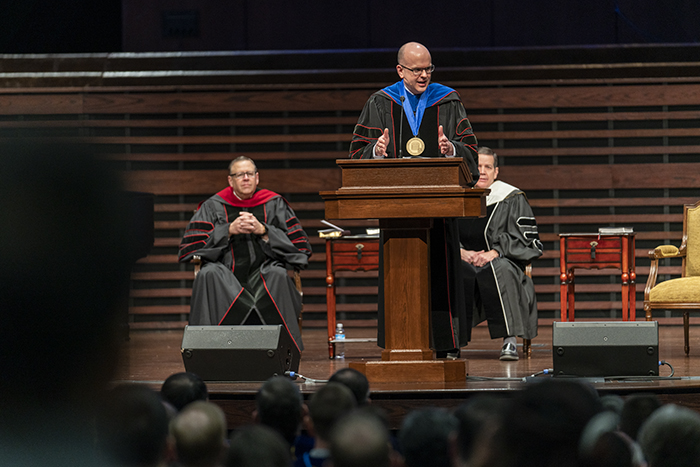Greenway exhorts seminary community to be ‘instruments of hope and healing’

During The Southwestern Baptist Theological Seminary’s spring convocation service, Jan. 21, President Adam W. Greenway invited the new and returning bachelor’s, master’s, and doctoral students to recommit themselves to “coming together.”
“If there was ever a time for the Southwestern Seminary family and for the Southern Baptist Convention to come together, it is now,” he said.
Preaching from Jeremiah 15:15-21 on the first day of the spring 2020 semester, Greenway reminded those assembled in MacGorman Chapel that “there is going to be pain and suffering when you are fully surrendered to God’s plan for your life. There just is. And it’s not just going to be from those who are opposed to God’s agenda in terms of the broader culture. There is going to be pain and suffering even from within those who name the name of Christ, who call themselves members of the household of faith.”
Calling this both a word and a warning, Greenway exhorted the Southwestern Seminary family to “always be on guard for ourselves, for our churches, for our ministries, for our institutions, that we do not succumb to becoming a person or an institution that becomes a tool in the hands of the enemy that is used to literally bring about hurt and pain in the lives of others.”
“If anything,” he said, “our institutions, our ministries, our churches must model ways that we are able to be builders of the soul, not destroyers of the soul; places where there is real hope and healing for the hurts.”
Noting that, even within the Southern Baptist Convention, many people seek to tear down others who disagree with them, Greenway said, “The call when people want to fight dirty is not to fight dirtier. The call when people want to go low is not to go lower.”
“The call is to stay faithful,” he said, “to realize it’s the Lord who fights the battles, it’s the Lord who takes vengeance, it’s the Lord who will settle all the scores. My responsibility is not to try to get even or even to get right, but it is to be right in my walk, my ministry, my commitment, my role. That’s what matters most.”
“My prayer,” Greenway concluded, “is that God would use you—the men and women who make up the community of faith called The Southwestern Baptist Theological Seminary and Scarborough College—to be instruments of hope and healing, of unity, rather than those who are stirrers up of strife, sowers of discord, dissension, division—those who ultimately become tools in the hands of the enemy, not in the hands of our Lord.”
In addition to Greenway’s sermon, the convocation service included the recognition of recently elected faculty, who each signed the seminary’s book of confessional heritage.
Greenway clarified that this book “is not significant in and of itself. But what it testifies to and represents is of extraordinary significance.” The book, which has been signed by every faculty member since Southwestern Seminary’s founding in 1908, indicates that the institution is “in lock-step solidarity” with the Baptist Faith and Message, “standing precisely where our convention of churches has said, ‘We will stand,’” Greenway said.
“There is the integrity of witness before the gathered community, before a watching world, that the elected faculty of Southwestern Seminary gladly, proudly, happily, enthusiastically say, ‘I put my signature, my pen, my name publicly to the truths that we confess as a seminary community,’” Greenway concluded.
The new faculty who signed the book were Joseph R. Crider, dean of the School of Church Music and Worship; Michael S. Wilder, dean of the Jack D. Terry Jr. School of Educational Ministries; David S. Dockery, distinguished professor of theology; Gregory A. Wills, research professor of church history and Baptist heritage; Charles T. Lewis, professor of church music and worship; and Travis S. Kerns, associate professor of apologetics and world religions.
In addition, Greenway recognized Chris Osborne, who began serving under presidential appointment this semester as professor of preaching and pastoral ministry, and Chris Shirley, who has returned to the faculty as professor of educational ministries following his earlier service at the seminary from 2007-2016.



